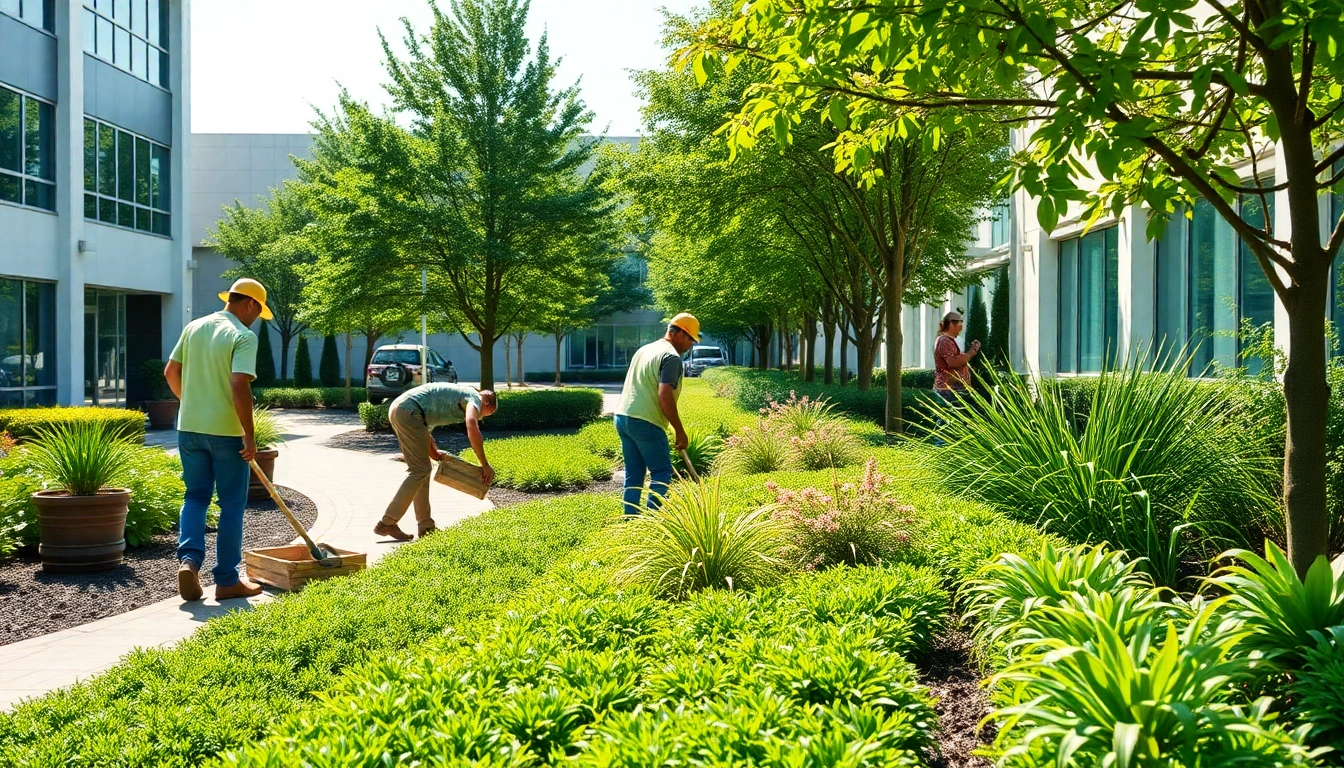Understanding Commercial Landscaping Contractors
Commercial landscaping contractors play a pivotal role in the maintenance and enhancement of outdoor spaces for businesses, institutions, and public areas. Their expertise ranges from design and installation to ongoing maintenance, contributing significantly to the aesthetics and functionality of commercial landscapes. In a world where first impressions matter, hiring commercial landscaping contractors can vastly improve the appeal of any property, adding value and enhancing the customer experience.
What They Do and Their Importance
Commercial landscaping contractors are specialists trained to manage and execute the design, installation, and maintenance of landscapes in commercial settings. Their work includes a wide array of activities, from planting and maintaining trees, shrubs, and flowers to creating walkways, patios, and outdoor seating areas. The importance of these contractors cannot be understated; they ensure that outdoor spaces are not only visually appealing but also functional and sustainable.
Additionally, these professionals possess knowledge of local horticulture, environmental regulations, and sustainable practices, which allows them to create landscapes that thrive in their specific environments. Moreover, consistent upkeep of outdoor areas is essential in preserving the value of a business property and enhancing its appeal to potential clients and customers.
Key Services Offered by Commercial Landscaping Contractors
The services provided by commercial landscaping contractors vary, accommodating different needs and preferences of their clients. Some of the key services include:
- Landscape Design: Customized plans that enhance the aesthetic and functional use of outdoor spaces.
- Installation Services: Professional planting, stonework, and installation of irrigation systems to create sustainable landscapes.
- Maintenance Services: Regular upkeep services that include mowing, trimming, pest management, and seasonal clean-ups.
- Irrigation Management: Ensuring efficient watering systems are installed and maintained, contributing to the health of the landscape.
- Hardscape Design: Building structures such as patios, walkways, and retaining walls that add structure and functionality to outdoor areas.
- Sustainable Practices: Implementing environmentally friendly practices, such as the use of native plants and organic gardening techniques.
By utilizing these services, businesses can create outdoor spaces that are inviting and beneficial to both their clients and employees.
Benefits of Professional Landscaping
Enhancing Property Value with Expert Designs
One of the most significant benefits of hiring commercial landscaping contractors is the enhancement of property value. Well-designed and maintained landscapes can increase a property’s market value by up to 20%. Landscaping provides a unique opportunity to stand out in competitive markets, capturing the attention of potential clients and customers.
Moreover, an attractive landscape invites customers to enter the premises, thereby increasing foot traffic and business generally. Such improvements can yield substantial returns on investment, making professional landscaping a wise choice for businesses looking to enhance their profitability.
Sustainability Practices in Commercial Landscaping
Sustainability is increasingly becoming a priority for businesses across various sectors. Commercial landscaping contractors can help companies adopt eco-friendly practices, which not only minimize environmental impact but also often reduce costs in the long run. Implementing native plant species and xeriscaping can significantly decrease water usage while still offering a vibrant landscape.
Additionally, sustainable landscaping practices can enhance biodiversity, attract pollinators, and create natural habitats within urban areas. Companies that adopt these practices often find themselves gaining positive recognition from environmentally conscious consumers, further enhancing their brand image.
Building a Lasting First Impression
The exterior of a business creates the first impression for potential customers and clients. A poorly maintained landscape can detract from a property’s value, while a professionally landscaped area creates a welcoming and inviting atmosphere. This is crucial in areas where competition is fierce; a well-maintained property signals professionalism and attention to detail.
Commercial landscaping contractors can strategically design outdoor spaces to guide traffic flow, highlight features, and provide comfortable seating areas, creating an environment that encourages customers to stay longer and engage with the business.
Common Challenges in Commercial Landscaping
Addressing Seasonal Changes and Environmental Factors
One of the primary challenges faced by commercial landscaping contractors is adapting to seasonal changes and local environmental factors. Different plants thrive in various climates, making it essential to select the right planting materials and maintenance practices. Additionally, weather conditions can affect the landscape’s appearance and health, requiring contractors to be flexible and knowledgeable about responsive care strategies.
Successful contractors will develop a landscaping plan that considers seasonal changes, ensuring the landscape remains vibrant throughout the year. This may include seasonal color planting, proper mulching techniques, and irrigation adjustments based on weather conditions.
Managing Budgets and Expectations
Budget management is another challenge for those in the commercial landscaping industry. Clients often have specific expectations regarding the scope of work, timelines, and costs. Clear communication from the outset is essential, as it defines the project parameters and prevents misunderstandings later. Successful contractors will provide detailed estimates, outlining all anticipated costs and timelines visibly and transparently.
Working collaboratively with clients to manage changes in scope, unforeseen costs, and timelines ensures smoother project implementation and maintains client satisfaction.
Ensuring Compliance with Local Regulations
Each jurisdiction may have its regulations and laws governing landscaping practices, from water usage to plant selection. Commercial landscaping contractors must stay informed to ensure compliance. This can include acquiring necessary permits, adhering to environmental guidelines, and following local zoning laws.
Contractors should build relationships with local governing bodies to remain updated on changes and maintain compliance, ultimately minimizing risk for their clients.
Best Practices for Successful Landscaping Projects
Effective Communication with Your Contractor
Communication is at the heart of any successful landscaping project. Clients should express their overall vision and specific requirements to contractors from the onset. Similarly, contractors should provide regular updates, share their insights, and be open to client feedback throughout the process. This collaborative approach ensures that both parties are aligned, reducing the likelihood of dissatisfaction or misunderstandings.
Detailed project timelines, expectations, and deliverables should be clearly outlined to facilitate ongoing communication and transparency.
Regular Maintenance: Key to Long-Term Success
Once the landscape installation is complete, regular maintenance is crucial to ensure the long-term success and health of the outdoor space. A professional landscaping contractor can offer ongoing maintenance services that include seasonal cleanup, lawn care, pruning, and pest management. This helps in maintaining the original design and protects the investment made in the property.
Establishing a regular maintenance schedule ensures that the landscape remains in peak condition, allowing businesses to enjoy the benefits of their investment for years to come.
Utilizing Technology for Enhanced Landscapes
With the rise of new technologies, commercial landscaping is evolving. Contractors can now utilize software for landscape design and project management, drones for surveying large areas, and smart irrigation systems that optimize water usage. Implementing technology can lead to more efficient project management and more sustainable landscaping practices.
By incorporating technology in their operations, commercial landscaping contractors can also provide clients with innovative solutions that enhance landscape design and reduce environmental impact.
Measuring Success in Your Landscaping Efforts
Key Metrics for Assessing Landscape Impact
To evaluate the effectiveness of landscaping efforts, businesses should establish specific metrics. These may include aesthetic improvements, increases in foot traffic, and overall customer satisfaction. Utilizing surveys and feedback forms can provide valuable insights into how the landscaping has impacted customer perceptions and business performance.
Moreover, analyzing any changes in property value or reputation following landscaping improvements can help businesses understand the return on investment effectively.
Client Satisfaction and Retention Strategies
Client satisfaction is pivotal in the landscaping industry. Establishing a reliable feedback mechanism allows clients to express their satisfaction levels and suggest improvement areas. Implementing these suggestions can lead to higher retention rates and foster long-term relationships between contractors and clients. Regular check-ins post-project completion can also demonstrate continued commitment to quality service and customer care.
Adapting to Feedback for Continuous Improvement
Landscaping is an iterative process, and adapting to client feedback is essential for growth and improvement in service delivery. Commercial landscaping contractors should regularly review client feedback to identify patterns and tailor their services accordingly. This proactive approach enables contractors to enhance their offerings continuously and stay ahead in a competitive market.
By fostering a culture of continuous improvement, commercial landscaping companies can not only elevate their standards but also adapt their strategies to meet the ever-changing needs of their clients.















Leave a Reply